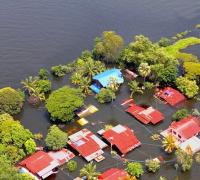Do climate change initiatives turn into disaster management at local levels?
Meso-level institutions at district and provincial levels are key to providing an enabling environment for climate change adaptation in development. Often they are doing what they can to support adaptation, but the focus tends to be on addressing current disasters rather than long-term trends, and there is often a disconnect between formal state policies and the actual practices on the ground.
These were some of the main messages coming out of the recent DIIS seminar on “Climate Change and Rural Institutions: Learning from the local level”. The seminar presented preliminary findings from an ongoing research programme in which DIIS works with research institutions in Uganda, Vietnam, Nepal and Zambia.
Brief summary of the seminar
DIIS researchers Ian Christoplos, Esbern Friis Hansen and Mikkel Funder presented findings from the work in Uganda, Vietnam and Zambia on how local governments, agricultural extension agencies, NGOs, farmer’s associations and other rural institutions are responding to climate change adaptation. Apart from the cross-cutting findings mentioned above, they also noted how differences in the nature and character of the state affect climate change adaptation. In some of the study countries, climate change is also becoming a means for rural institutions to challenge the authority of the central state and call for more decentralization.
Senior Technical Adviser Mike Speirs from Danida spoke on the importance of rural institutions in climate change adaptation. He gave the example of experiences from Mozambique, and mentioned how Danida, the EU and the Mozambican Government are planning a programme on climate change adaptation in which 60% of the proposed budget will be used by local government. Mike Speirs also mentioned the importance of NGO support in climate change adaptation, which has taken on activities left undone by the state in many rural areas.
This was followed by comments from Thomas Sikor, Professor of Environment and Development at the University of East Anglia. He pointed to the interesting role of meso-level institutions in adaptation, and noted the role of social contracts, i.e., what do citizens and states expect from each other in the face of climate change. Thomas Sikor noted that in the cases presented the central state seems to take disaster response seriously, while less attention and funding has so far been directed to long-term climate change adaptation at local levels. An important question, therefore, is whether and how climate change can become part of the social contract?
DIIS Experts




